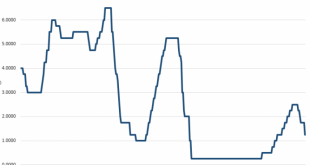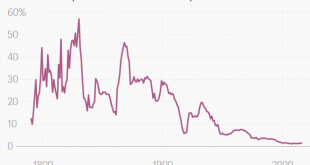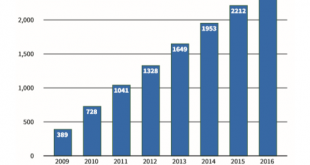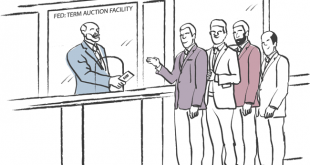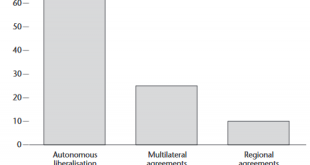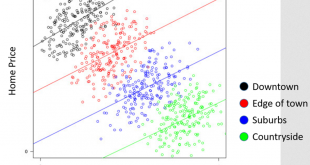The Federal Reserve this morning slashed the target federal funds rate by 0.5 percent today. According to CNBC: The Federal Reserve moved to an enact an emergency interest rate cut after officials saw the coronavirus having a material impact on the economic outlook, Chairman Jerome Powell said Tuesday. Powell held a news conference following the central bank’s decision to cut overnight interest rates by half a percentage point. He said the Fed “saw a risk to the...
Read More »Mises: To Adopt Keynesian Terminology Is to Legitimize It
Some years ago, there was published a book in the German language with the title L.T.I. These three letters stood for three Latin words, lingua Tertii Imperii, the language of the Third Reich. And the author, a former professor of Romance languages at one of the German universities, described in this book his adventures during the Nazi regime. And his thesis was that all people, without any exception, in Germany of course, were Nazis—not because they had accepted...
Read More »The US’s “Free Trade” Isn’t Very Free
The false notion that the US has eliminated virtually all of its barriers to foreign imports has been repeated more and more in recent years. The claim is made both by advocates for free trade and by critics of free trade. For instance, Patrick Buchanan has claimed only American elites “are beneficiaries to free trade” while implying the US either has free trade, or something close to it. Rather than insulate US companies from global competition, Buchanan insists,...
Read More »The EU’s Latest Screw-You to the UK Shows a Big Problem with Trade Agreements
All too often, discussion over trade deals focuses almost solely on tariffs. It’s true that tariffs—i.e., taxes—are always a significant barrier to free exchange at all levels, but there are also plenty of ways to block or lessen trade that are not primarily tariff-based. Recent conflicts over the pending negotiations between the UK and the EU are a reminder of this. For instance, The Guardian reported yesterday “The EU will demand the right to punish Britain if...
Read More »Central Banking since the 2008 Financial Crisis
This article is part of the Understanding Money Mechanics series, by Robert P. Murphy. The series will be published as a book in late 2020. In chapter 5 we reviewed the textbook analysis of how a central bank buys government debt in “open market operations” to add reserves to the banking system, with which commercial banks can then advance loans to their own customers. However, in the wake of the financial crisis of 2008, the Federal Reserve and other central banks...
Read More »Mises and the “New Economics”
[This article is excerpted from a talk delivered on February 22, 2020 at the Austrian Student Scholars Conference, hosted by Grove City College in Pennsylvania.] I. Introduction What a wonderful gathering of students today, on this impressive and beautiful campus. We can see why Hans Sennholz loved this place, and why Drs. Herbener and Ritenour so enjoy living and teaching here. You are all too young to serve as the “remnant,” so we will consider you the vanguard...
Read More »The WTO Is Both Irrelevant and Unnecessary
The World Trade Organization (WTO) is in a state of crisis. When it comes to trade negotiations among large states like the US, India, and China, the WTO has been shown to be an organization that is largely irrelevant. Despite grandiose dreams of a global trade organization that would enforce global bureaucrats’ broad vision for multilateral trade agreements, the world looks more and more like it neither wants nor needs an organization like the WTO. CNBC reports...
Read More »Tax Burdens, Per Capita Income, and Simpson’s Paradox
How many times have you heard that higher taxes mean greater social welfare and economic development? The statement is backed up by a touch of popular wisdom: “More taxes, more public services.” Almost incontestable empirical evidence is also cited: with very few exceptions, the richest countries’ tax rates are very high, whereas taxes in poor countries are relatively low. This article analyzes the statistical relationships that suggest that high tax burdens...
Read More »Nationalism as National Liberation: Lessons from the End of the Cold War
During the early 1990s, as the world of the old Soviet Bloc was rapidly falling apart, Murray Rothbard saw it all for what it was: a trend of mass decentralization and secession unfolding before the world’s eyes. The old Warsaw Pact states of Poland, Hungary, and others won de facto independence for the first time in decades. Other groups began to demand full blown de jure secession as well. Rothbard approved of this, and he set to work encouraging the secessionists...
Read More »Is Free Market Economics Too “Ideological”?
Free market economics is often ignorantly dismissed for being “ideological” rather than scientific. It probably sounds smart to the economically illiterate, but it is decidedly not. It doesn’t mean nearly what most people assume it does. The word “free” in free market economics is not used as a normative value judgment but indicates an economy that is unaffected by exogenous (from the outside) factors. “Free” therefore means that it is the market economy in and by...
Read More » Swiss Economicblogs.org
Swiss Economicblogs.org

